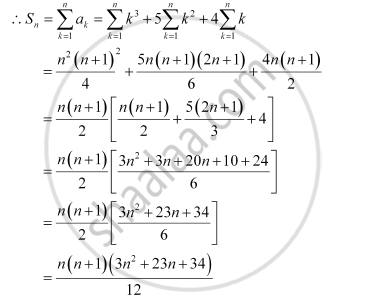Advertisements
Advertisements
प्रश्न
Find the sum to n terms of the series whose nth term is given by n (n + 1) (n + 4).
उत्तर
an = n (n + 1) (n + 4) = n(n2 + 5n + 4) = n3 + 5n2 + 4n

APPEARS IN
संबंधित प्रश्न
Find the sum to n terms of the series 1 × 2 × 3 + 2 × 3 × 4 + 3 × 4 × 5 + …
Find the sum to n terms of the series 3 × 12 + 5 × 22 + 7 × 32 + …
Find the sum to n terms of the series `1/(1xx2) + 1/(2xx3)+1/(3xx4)+ ...`
Find the sum to n terms of the series 3 × 8 + 6 × 11 + 9 × 14 +…
Find the sum to n terms of the series whose nth terms is given by n2 + 2n
Find the sum to n terms of the series whose nth terms is given by (2n – 1)2
Show that `(1xx2^2 + 2xx3^2 + ...+nxx(n+1)^2)/(1^2 xx 2 + 2^2 xx3 + ... + n^2xx (n+1))` = `(3n + 5)/(3n + 1)`
13 + 33 + 53 + 73 + ...
22 + 42 + 62 + 82 + ...
1 × 2 + 2 × 3 + 3 × 4 + 4 × 5 + ...
Find the sum of the series whose nth term is:
2n3 + 3n2 − 1
Find the sum of the series whose nth term is:
n3 − 3n
Find the sum of the series whose nth term is:
n (n + 1) (n + 4)
Find the 20th term and the sum of 20 terms of the series 2 × 4 + 4 × 6 + 6 × 8 + ...
Write the sum of the series 2 + 4 + 6 + 8 + ... + 2n.
1 + 3 + 7 + 13 + 21 + ...
3 + 7 + 14 + 24 + 37 + ...
If ∑ n = 210, then ∑ n2 =
If Sn = \[\sum^n_{r = 1} \frac{1 + 2 + 2^2 + . . . \text { Sum to r terms }}{2^r}\], then Sn is equal to
Write the sum of 20 terms of the series \[1 + \frac{1}{2}(1 + 2) + \frac{1}{3}(1 + 2 + 3) + . . . .\]
Write the 50th term of the series 2 + 3 + 6 + 11 + 18 + ...
Let Sn denote the sum of the cubes of first n natural numbers and sn denote the sum of first n natural numbers. Then, write the value of \[\sum^n_{r = 1} \frac{S_r}{s_r}\] .
The sum to n terms of the series \[\frac{1}{\sqrt{1} + \sqrt{3}} + \frac{1}{\sqrt{3} + \sqrt{5}} + \frac{1}{\sqrt{5} + \sqrt{7}} + . . . . + . . . .\] is
The sum of the series \[\frac{2}{3} + \frac{8}{9} + \frac{26}{27} + \frac{80}{81} +\] to n terms is
3 + 5 + 9 + 15 + 23 + ...
2 + 5 + 10 + 17 + 26 + ...
Find the sum of the series (33 – 23) + (53 – 43) + (73 – 63) + … to n terms
Find the sum of the series (33 – 23) + (53 – 43) + (73 – 63) + ... to 10 terms
The sum of all natural numbers 'n' such that 100 < n < 200 and H.C.F. (91, n) > 1 is ______.
A GP consists of an even number of terms. If the sum of all the terms is 5 times the sum of the terms occupying odd places, the common ratio will be equal to ______.
